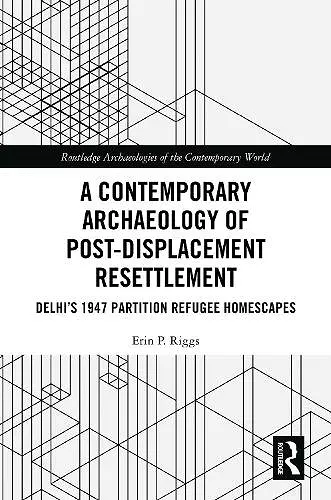A Contemporary Archaeology of Post-Displacement Resettlement
Delhi’s 1947 Partition Refugee Homescapes
Format:Hardback
Publisher:Taylor & Francis Ltd
Published:14th May '24
Currently unavailable, our supplier has not provided us a restock date

This book explores the archaeology of the 1947 Partition, the largest mass migration in human history, and the resulting resettlement of half a million refugees in Delhi, India’s capital city.
Interweaving material analysis with oral history collection and archival sources, this book considers how Delhi’s Partition refugees have interacted with the city's built landscapes through time. It demonstrates how government-built refugee colonies, influenced by both socialist and capitalist design philosophies, provided an effective and adaptable setting for resettlement. In contrast, it illustrates how Delhi’s pre-Partition landscapes—including ‘evacuee properties’ vacated by out-migrating Muslims and sections of the planned, colonial capital—have proven more problematic venues for rehousing. In these contexts, refugee families navigated life within homes shaped by past occupants and colonial-era wealth disparities. The book highlights that despite such difficulties and the unprecedented scale of Partition’s impact on Delhi, refugees have obtained an impressive degree of material success and social acceptance in the city. This example challenges assumptions about the aid-dependency of refugee communities, the potential effectiveness of public housing, and the mutability of national belonging.
This interdisciplinary case study will be of interest to scholars in varied fields of study, including archaeology, architectural history, cultural anthropology, human geography, and South Asian studies.
Erin Riggs has done pioneering work in the field of contemporary archaeology. This is particularly significant given the near absence of studies on the archaeology of the modern world in South Asia. Riggs’ work looks at refugee colonies, evacuee property areas, and other post-partition residential neighborhoods in Delhi following the 1947 Partition of India and Pakistan. She has produced a riveting urban history of post-Partition Delhi, based on the lived experience of these refugee populations and the analysis of material patterns within homes that are still in use. Her study draws on maps, ethnographies, and images of home spaces. One critical issue that she raises is that there has been far too much stress on the use of ancient material symbols in forging national identities. Instead, she joins others in arguing that a feeling of belonging can also be tied to modern material landscapes. Thus ‘legitimacy and belonging’ can justifiably be drawn from more recent material forms and not necessarily from those in the distant past. Through a rigorous study that combines quantitative and qualitative approaches, her impressive study paves the way for contemporary archaeologists to make significant policy interventions. At the same time, she also makes a powerful case for doing more contemporary archaeology, particularly in South Asia.
- Dr. Supriya Varma, Azim Premji University
This highly original book, the first monograph in contemporary archaeology in South Asia, explores the Partition of India in 1947. Yet instead of looking at the trauma of division and displacement, as has often been the case, Erin Riggs examines the reconstruction of identities in post-migration Delhi. By focusing on households, she shows how people were able to remake a sense of home, self and social belonging. And in line with the best contemporary archaeology, she eloquently demonstrates the relevance of the recent past to understand the challenges of the present and imagine better futures. An essential read not only for contemporary archaeologists, but for anybody interested in home and migration from the point of view of archaeology, anthropology and material culture studies.
- Dr. Alfredo González-Ruibal, Institute of Heritage Studies
Riggs’ book provides a fascinating detailed account of the afterlife of partition and the way diverse displaced communities on the Indian side of the divide variously persevered and thrived after independence and shaped a modernising independent state. The work is rich in ethnographic detail describing the intimate material processes of fortitude, adaptability and modernisation along with at times deeply poignant accounts of displaced households across national divides and their paired distributed symmetries of care and empathy despite harrowing legacies of violence and displacement. The empirical detail of Rigg’s work provides much diverse material for reconsidering the nuances of the relative successes and short comings of resettlement policies and processes more widely and the nature and consequences of displacement more generally.
- Dr. Victor Buchli, University College London
ISBN: 9781032161167
Dimensions: unknown
Weight: 650g
246 pages